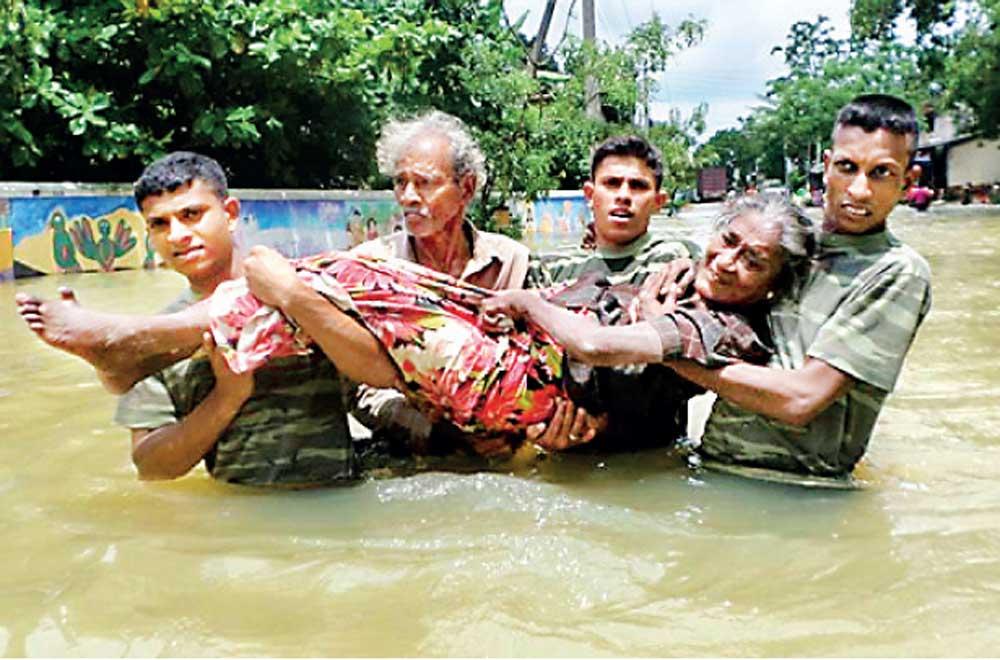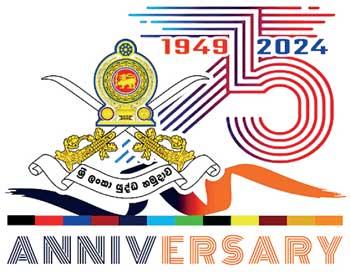Reply To:
Name - Reply Comment

The Sri Lanka Army has consistently demonstrated its readiness to assist nation during natural disasters
 This year marks a historic milestone for the Sri Lanka Army as it celebrates its diamond jubilee —75 years of unwavering dedication to safeguarding the nation’s sovereignty, territorial integrity, and independence. Since its inception on 10 October 1949, Sri Lanka Army stood at the forefront of national security, defending the motherland and its people against visible or invisible challenges.
This year marks a historic milestone for the Sri Lanka Army as it celebrates its diamond jubilee —75 years of unwavering dedication to safeguarding the nation’s sovereignty, territorial integrity, and independence. Since its inception on 10 October 1949, Sri Lanka Army stood at the forefront of national security, defending the motherland and its people against visible or invisible challenges.
At the moment where the institution celebrates its diamond jubilee tomorrow (10 October), it is the prime time to honour the sacrifices of all who contributed to shape this illustrious journey from then to the present leadership.
Lieutenant General Vikum Liyanage RWP RSP ndu, who played a pivotal role in humanitarian operations to end a 30-year prolonged war, currently, serves as the 24th Commander of the Army. Under his leadership, Sri Lanka Army continues to uphold its dedication to defend the nation progressively. His leadership, shaped by years of experience and valour, reflects the unyielding commitment of the institution towards its duties and responsibilities. The current Commander-in-Chief, President Anura Kumara Dissanayake, also plays a vital role in guiding the Army’s vision and progress, alongside Prime Minister Dr. Harini Amarasuriya and Secretary of Defense Air Vice Marshal Sampath Thuyacontha (Retd) to fulfill the aspirations of the nation in the coming years.
A Legacy of Sacrifice and Valour
The Sri Lanka Army’s history is deeply connected with the nation’s struggle to maintain sovereignty and territorial integrity of the country. Its role in the elimination of 30 years of terrorism is one of the most defining chapters in its legacy. Valourous and dedicated troops of the Sri Lanka Army successfully terminated the bitter, decades-long menace of terrorism, which tore apart families and communities, on 18 May 2009, bringing hope for a new beginning. The war, initiated with the assassination of Jaffna Mayor Alfred Duraiappah in 1975 by Velupillai Prabhakaran, culminated in a hard-earned victory, paying blood and tears of thousands of soldiers and civilians.
The humanitarian operations against Fourth Eelam War, launched on 26 July 2006, under the command of Field Marshal Sarath Fonseka and the leadership of His Excellency President Mahinda Rajapaksa marked a decisive turning point in the nation’s history. The operation named “Eastern Humanitarian Operation,” aimed to restore basic needs and protect civilians from the atrocities committed by the Liberation Tigers of Tamil Eelam (LTTE). The war reached a critical point when the LTTE blocked the Mavil Aru sluice gate, depriving 30,000 civilians access to water. This marked the beginning of a humanitarian effort to liberate the area to secure peace in the region.
Following the Eastern humanitarian operation, the focus shifted to the North, where the LTTE had consolidated its power. The Northern humanitarian operation, initiated with the goal of liberating the Northern Province, was arduous and strategically complex. A key moment in this operation was the capture of the Silavathura Sea Tiger base in 2007 - a crucial supply hub for the LTTE. The combined Armed forces of the Army and Navy decisively captured the north- west supply hub of the foe, and by September 2, the camp was captured.
The ultimate victory in May 2009 not only signified the end of terrorism in Sri Lanka but also opened a new chapter for the country. Yet, it came at a great price. Over 23,562 Army personnel were either killed or reported missing in action, and more than 23,200 were injured. However, Sri Lanka Army’s immense sacrifice was recognised through numerous gallantry awards and accolades of 33,131 which included 29 Parama Weera Vibhushanaya (PWV), the nation’s highest military honour awarded for supreme heroism, along with 18 Weerodara Vibhushanaya (WV), 312 Weera Wickrama Vibhushanaya (WWV), 5,101 Rana Wickrama Padakkama (RWP), and 27,671 Rana Sura Padakkama (RSP) medals.
Nation Building and Rehabilitation
While the Army’s primary mission is to safeguard national security, its contribution to post-war rehabilitation, reconciliation and nation-building has been equally commendable. After the end of the war, the Army played a leading role in rehabilitating and resettling displaced civilians and ex combatants in the Northern and Eastern Provinces, working tirelessly to restore normalcy in war-torn areas. These efforts helped to mend the fabric of society, enabling communities to heal and rebuild their lives.
The Army’s involvement in national development has extended far beyond its main responsibility. It has played a significant role in assuring best healthcare service, infrastructure development, education, agriculture, and cultural reconciliation initiatives. Through projects such as the “East Navodaya” number of infrastructure initiatives and a range of agricultural ventures were initiated contributing to the country’s economic progress. Successful agricultural projects have been launched at Vellankum, Menikfarm, Adiapulianthulam, Neeraviya, Kandakadu, Galkanda, Balella, Yala Palatupana Farm and Aralaganwila Agricultural Training School, the Army Headquarters Agricultural Project, Kohilawagurawatta Regimental Farm helping to boost food security and contribute to the development of nation’s agricultural production. In addition, the agri projects initiated by the Sri Lanka Army Corps of Agriculture and Livestock at every Army Camps have successfully progressed achieving its desired objectives.
Responding to National Emergencies and Disasters
The Sri Lanka Army has also consistently demonstrated its readiness to assist nation during natural disasters and national emergencies. From 2004 Tsunami to the Meethotamulla landslide and the Covid-19 pandemic, the Sri Lanka Army has been at the forefront of rescue and relief operations. In particular, the establishment of the Sri Lanka Army Centre for Disaster Response Training in Gampola is a significant milestone that marks the Army’s proactive approach in preparing for future disasters. This centre offers research and training in civil-military operations, ensuring the ability of Sri Lanka Army to handle both domestic and international crises.
Moreover, the Army’s commitment to restraining illegal activities, such as drug trafficking, further underscores its role as a guardian of the nation in the perspectives of its social fabric. Under the direction of the Commander of the Army Lieutenant General Vikum Liyanage RWP RSP ndu, the troops have ramped up intelligence and operational efforts to control the menace of narcotic drugs, seizing quantities of hashish, kush, and other illicit substances to safeguard future generations from the perils of addiction.
International Recognition in Peace-keeping
The Sri Lanka Army has also earned international acclaim for its contribution to United Nations Peacekeeping Missions. Since its first deployment, Sri Lankan troops have been deployed in conflict zones worldwide such as Haiti, Lebanon, South Sudan, the Republic of Chad, and Mali. To date, more than 20,775 soldiers have served under the UN flag, earning Sri Lanka close to $300 million in foreign exchange.
Adding to its list of achievements, the Sri Lanka Army has developed the Unicorn/Unibaffle vehicles, which are used in UN peacekeeping missions. Manufactured by the Sri Lanka Electrical and Mechanical Engineers Corps (SLEME), these vehicles used at Sri Lankan Combat Convoy Company comply with international standards, saving significant foreign exchange while enhancing the Army’s technical capabilities.
Looking to the Future
As the Sri Lanka Army celebrates its 75th anniversary, it continues to honour its legacy of valour and service further for the wellbeing of the nation. The Army’s unwavering dedication to the nation—whether in times of war or peace—remains at the core of its identity. From protecting the country’s borders to rebuilding communities and contributing to national development, the Sri Lanka Army’s role has evolved significantly over the years, reflecting both the challenges and opportunities ahead.
The Army’s vision for the future includes self-reliance in food production by 2030, further modernisation of its industrial capabilities, and continued leadership in disaster management and national security. As the nation moves forward, the Sri Lanka Army will undoubtedly continue to be the proud defender of the motherland, embodying the spirit of sacrifice, resilience, and unity that has defined for 75 years.
(This is an article sent by the Sri Lanka Army)